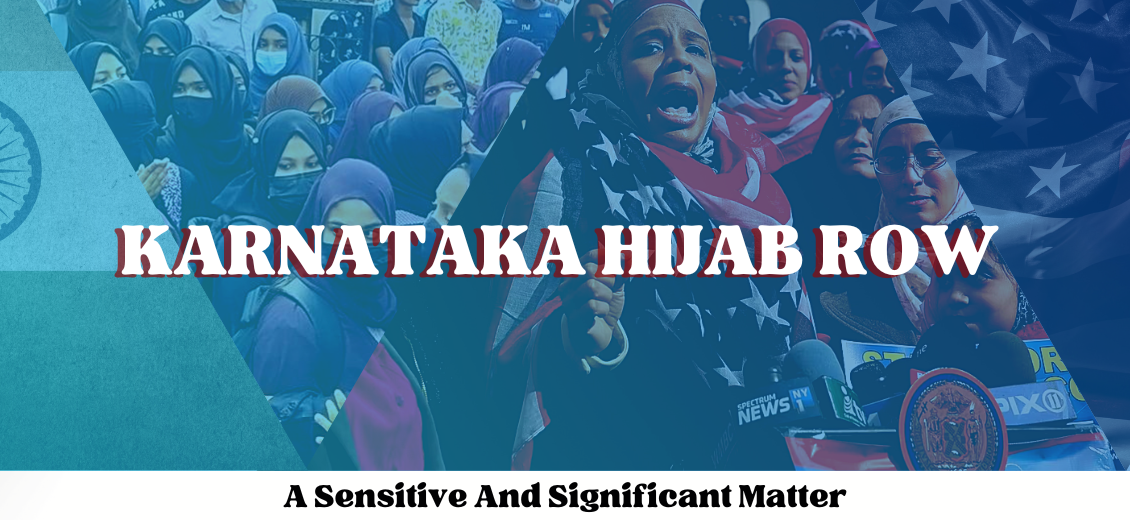Karnataka Hijab Row: A Sensitive And Significant Matter
Blogs Home
- 01 Jul 2022

In February 2022, a video of a female student clad in a burqa and hijab went viral on social media. Heckled by a large group of male students sporting saffron scarves around their necks and shouting Hindu religious slogans while entering her college premises, the girl retaliated with Islamic religious slogans in response. The animosity between young adolescents of two faiths became a topic of discussion instantly and drew national and international attention. Social media and television channels got flooded with opinions, debates, and discussions about who did what and why.
The incident happened in the Mandya district of Karnataka, but the event that led to the confrontation originated in the Udupi district of Karnataka. Six Muslim female students of Government Pre-University (PU) College for Girls in Udupi, Karnataka staged a protest against the college authorities in December 2021 when they were not allowed to attend classes wearing a Hijab. Hijab is a headscarf worn by Muslim women to cover their hair and neck in the presence of men who are not related to them. This Islamic practice protects women’s modesty and privacy. The college development committee instructed students to follow the college dress code that did not allow wearing hijab in the classroom. But the students went on to show their dissent against change in the dress code of their institution.
Within a few days, other Muslim female students of several educational institutions across the Udupi district wore hijabs showing their solidarity with the girls protesting against the ban on hijab. Hindu students showed their displeasure against this demand by wearing saffron scarves on college premises. The college administration ordered students to follow the college dress code till the government issued an order regarding the matter. Students wearing hijabs or saffron scarves did not get permission to enter their institutions.
State government’s take on the issue
The government of Karnataka had to intervene by shutting down colleges and schools after the Mandya controversy for a few days. State Government passed an order regarding the dress code for students mentioning Karnataka Education Act - 1983. As per the act, students needed to follow the dress code decided by their respective College Development Committees. These committees are free to prescribe a uniform for the institution. In case of not having a uniform, students are not allowed to wear any piece of clothing that affects public law and order, equality, and integrity.
The move to High Court
One of the students from Government PU College for Girls, Udupi moved the Karnataka High Court with a writ petition to allow her and her fellow students into the classroom wearing a hijab. It was stated in the petition that it is their fundamental right to profess their religion guaranteed under Article 25 of the Indian Constitution; it is an essential practice in Islam, and colleges cannot bar their entry into the classrooms with a hijab. The petition also said that the college administration interfered with the fundamental right to education of female students when they tried to profess their religion wearing hijab inside the classroom.
In March 2022, a three-judge bench of the Karnataka High Court comprising Chief Justice Ritu Raj Awasthi, Justice Krishna S Dixit, and Justice J M Khazi subjected the ban on hijab in educational institutions to the ‘essential religious practice’ test. The bench upheld the restriction on wearing hijab inside classrooms as they found it not to be an essential religious practice in Islam. According to the bench, the practice was not essential but recommendatory, and not following it could not amount to any change in religion. So, the bench decided that the practice of wearing hijab by female students does not hold any ground for protection under Article 25 of the Indian Constitution.
The essential religious practice test is a doctrine evolved by the Supreme Court of India to protect essential religious practices under fundamental rights integral to a particular religion. A seven-judge bench of the SC in the ‘Shirur Mutt’ case in 1954 came up with this doctrine. Whether a practice is essential and integral to a religion or not has been decided using this doctrine ever since.
The bench observed that it is completely at the discretion of the educational institute to have a uniform for the students, and that the students need to abide by the rules set by the institution; prescribing uniforms in educational institutions does not violate any fundamental right.
Last resort: Supreme Court
Dissatisfied with the judgment, the petitioners moved the Supreme Court challenging the Karnataka High Court order with the plea to hear the case early as their exams were approaching and they wanted to appear for the exam wearing hijab. Supreme Court refused to give them an early hearing saying exams have nothing to do with the issue. On 22nd April 2022, two of the petitioners were not allowed to write their exam when they demanded to do so wearing hijab only. These girls chose to walk away from their 12th board examination centre over giving exams without wearing hijab.
The Karnataka High Court judgment was based entirely on the essential religious practice aspect of wearing the hijab. The Supreme Court is expected to give a judgment that restores communal harmony in our country and secures the future of our nation.
Why is this case so sensitive and significant?
What makes this case so sensitive and significant is the involvement of youngsters who are at a crucial juncture in their lives. Young minds are ready to jump into the battle to stand up for their faith, confront and challenge the other faith, and willingly sacrifice their future and career to serve their religion.
It is a worrisome situation. People encouraging and rewarding adolescents showing their dissatisfaction in an aggresive way either lack the maturity to understand the gravity of the situation or willingly ignore it. The psychological impacts of such events can have long-lasting effects on India’s youth, impacting their psyche and as well as the harmony of our society.

Priyanka Todariya




